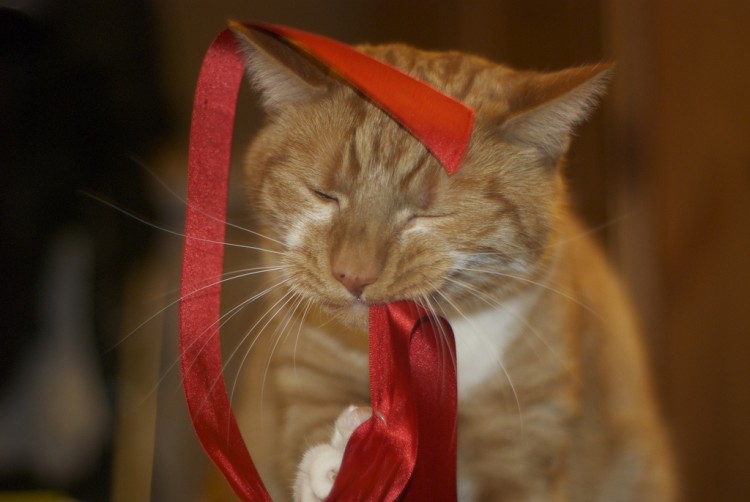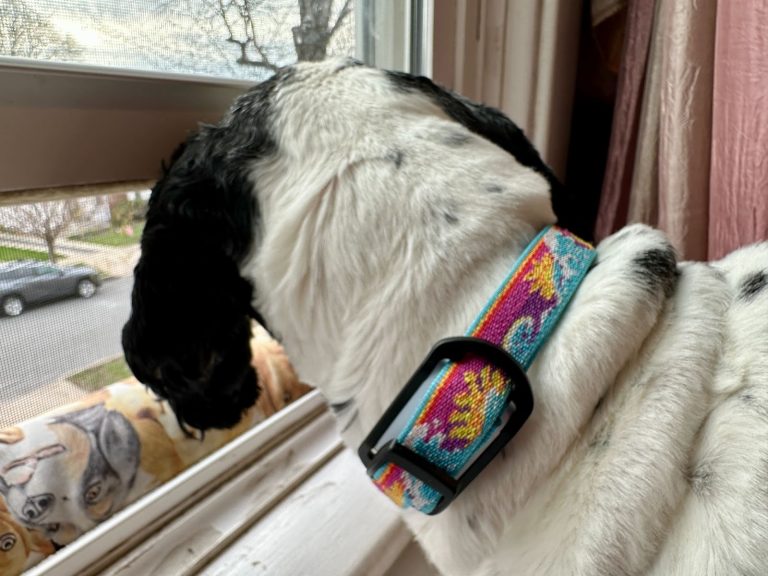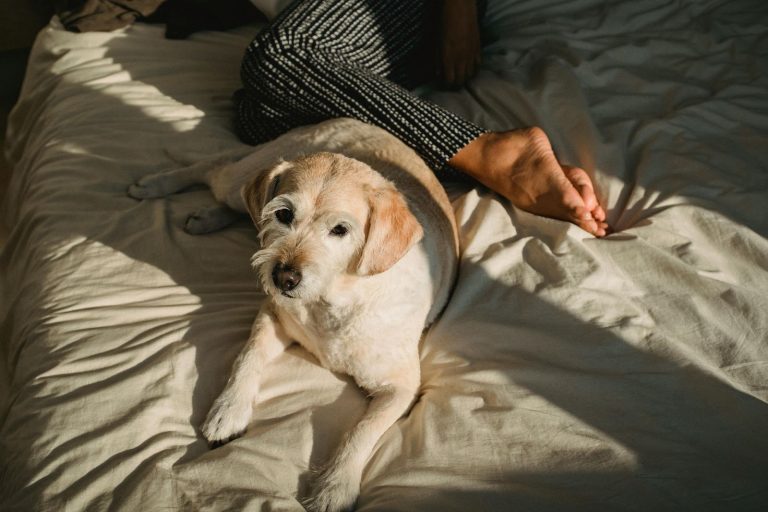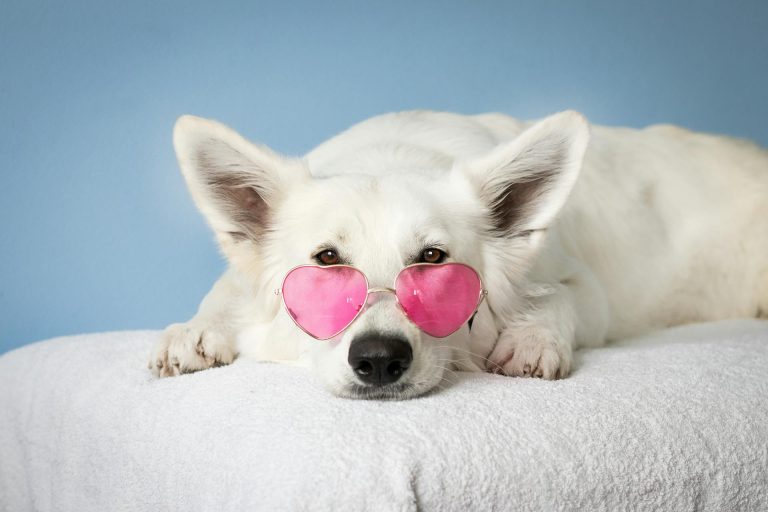Holiday Pet Safety: Essential Tips for Keeping Your Pets Safe
Ensure your pets’ well-being with our expert guide on holiday pet safety. Learn crucial tips to protect your furry friends this festive season.
This expert guide was written by a veterinarian, Dr. Debora Lichtenberg, VMD, with contributions from Dr. Pippa Elliott, BVMS, MRCVS. It was last reviewed on July 10, 2024
If you have questions or concerns, call your vet, who is best equipped to ensure the health and well-being of your pet. This article is for informational purposes only and is not a substitute for professional medical advice, diagnosis or treatment. See additional information.

- The Importance of Holiday Pet Safety
- Dangerous Holiday Foods and Kitchen Safety
- How to Prepare and Maintain a Pet-Safe Holiday Environment
- Preventing Holiday Hazards for Pets
- Holiday Plants That Can Make Your Pet Sick
- A Holiday Pet Safety Wish List — From Your Pets
- Holiday Pet Safety for Guests and Children
- Final Thoughts on Holiday Pet Safety

Don’t leave your pet’s safety to chance
Sign up for Petful recall alerts today.

The Importance of Holiday Pet Safety
The holidays are always full of fun, families, friends, food, and furry friends trying to get into as much trouble as possible. Holiday pet safety is critical, so in this article, you’ll find plenty of safety tips.
No matter how many times people read these warnings, we still see a load of holiday-related emergencies that could have been avoided with more careful monitoring by pet parents.

Dangerous Holiday Foods and Kitchen Safety
Holidays often center around food, especially during Thanksgiving. Here are essential holiday pet safety tips for foods and kitchens:
Turkey
- Avoid feeding pets fat, skin, bones, giblets, or too much turkey meat.
- Even small amounts of plain turkey can be harmful if pets aren’t used to table scraps.
- Keep turkey string away from pets, especially cats who love to play with string, to prevent intestinal obstruction.
Stuffing
- Stuffing often contains garlic and onion, which are toxic to pets and can cause GI irritation and red blood cell damage.
- Ingredients like sausage and cranberries can also cause stomach upset or toxicity.
- Feeding pets small amounts of stuffing throughout the day increases the risk of toxicity.
Mashed Potatoes, Sweet Potatoes, Marshmallows
- Fatty, buttery, creamy, and sweet foods can cause extreme GI upset.
- GI upset can lead to pancreatitis, especially in small dog breeds and cats.
- Do not scrape these foods into your pet’s bowl.
Dough
- Raw dough with yeast can be dangerous, causing bloating, alcohol poisoning, and severe illness.
- Keep raw dough out of pets’ reach while baking.
- Dough toxicity requires emergency vet care.
Raisins and Grapes
- Many holiday dishes contain grapes or raisins, which can cause kidney failure in pets.
- Any ingestion of grapes or raisins requires emergency treatment.

Xylitol
- Xylitol, a sweetener toxic to pets, is found in many products like candy, gums, and baked goods.
- It causes insulin release leading to hypoglycemia (low blood sugar), with signs such as vomiting, lethargy, in-coordination, and seizures.
- Xylitol can damage the liver, potentially causing liver failure within a few days.
Chocolate and Caffeine
- The signs of chocolate toxicity range from hyperactivity to GI signs, tremors, seizures, and death in severe cases.
- The darker the chocolate, the more serious the toxicity; baker’s chocolate is especially dangerous.
- Always keep baker’s chocolate bars far away from pets.
Marijuana and Pot Edibles
- These are potentially toxic, often coming from marijuana left on a low table, patio, or in a bedroom, including pot brownies.
- As the party host, ask guests to lock up their stash to prevent pet exposure.
Why Holiday Scraps Are Worse Than Everyday Scraps
- Can you give your pets any food during the holidays?
- While a few table scraps or healthy human food items are fine in everyday life, Thanksgiving “scraps” are rich, sweet, or fatty.
- Holiday scraps differ significantly from usual shares and often involve too much food for pets to handle.

How to Prepare and Maintain a Pet-Safe Holiday Environment
Careful and calm advance planning can ensure holiday pet safety. Visitors, flashing lights, strange smells, and frequent arrivals and departures can unsettle pets, transforming a quiet household into a chaotic environment.
To help your pet cope, consider the following:
- Keep Decorations and Presents Out of Reach: This reduces the risk of chew hazards.
- Provide a Safe Retreat: Give your pet a place to retreat to, away from the madness. A crate is ideal — the dog can remove themselves to a safe place when the festivities ramp up. Avoid overdecorating the crate as it is the dog’s space, not yours.
- Manage Your Pet’s Interaction with Guests: Think about how your pet copes with guests. If necessary, set a room aside for the dog or cat to hunker down until the festivities are over.
A Safe and Private Space
Cats:
- If your cat hates change or commotion, give them a safe area, a sanctuary away from holiday commotion. They will be happier and will not suffer from a lack of human contact for several hours.
- Provide food, water, and litter in their safety lair to keep them stress-free.
Dogs:
- What you do with your dog will depend on their personality. Your Golden Retriever may love sitting with guests, but a high-strung terrier or Beagle may need a safe space to rest.
- Have a designated area where behaviorally challenged dogs can stay away from guests. A crate is ideal — learn more about crate training.

Preventing Holiday Hazards for Pets
Electric Cords
- Festive, flashing fairy lights mean extra cords and wires trailing around the house.
- Hide all cords out of the way or protect them with chew-proof covering to prevent curious pets from chewing on them.
- If your pet bites through a cord, turn off the power supply before rescuing your pet.
Glass Ornaments
- If your Christmas tree gets knocked over by a climbing cat or inquisitive dog, broken glass can injure your pet.
- Opt for shatterproof plastic decorations to keep your pets safe.
Candles, Potpourri, Tart Warmers, Fragrance Oils
- Be cautious with odor-masking candles, fragrance products, and open flames as they can be hazardous.
- Toxic essential oils, potpourri, and hot oils can harm pets.
- Monitor candles and fireplaces carefully, especially during holidays when you’re busy entertaining.
Doors and Windows
- Monitor open doors and windows to prevent pets from escaping, especially when the house gets overheated during holiday activities.
- Ensure guests are aware of the potential for pets to escape through open doors and windows, particularly indoor cats.
Surfaces and Tabletops
- Keep food gifts, candy, and dishes out of pets’ reach.
- Avoid leaving nibbles like nuts or candy on low tables.
- Designate a family member to help clean up after guests and ensure leftover food is not accessible to pets.
High Alert in the Kitchen
- Keep all foods in all stages of preparation away from your pet.
- Ensure your pets can’t:
- Get into cooking ingredients
- Eat the turkey string
- Walk on a hot stove, warming tray, or open oven door
- Swallow aluminum foil or plastic wrap
- Get into the trash
Flowers and Plants
- Keep flowers and plants on higher surfaces to prevent pets from chewing on them.
- While toxicity from chewing on plants is often limited to gastric upset, some plants can be truly toxic.

Holiday Plants That Can Make Your Pet Sick
Every holiday season, vets get phone calls from worried pet owners who find their dog or cat chewing on holiday greenery. To avoid potential poisoning, keep holiday plants out of reach of pets. Here are the most common holiday plants and their dangers:
Amaryllis
- If you receive an amaryllis as a present, it’s often a bulb in a box, making it less accessible to pets. However, a flowering amaryllis plant poses a real danger.
- Alkaloids in the bulb and leaves can cause vomiting, diarrhea, loss of appetite, or hyper-salivation if ingested.
- Severe cases, including restlessness, tremors, or trouble breathing, require a visit to an emergency veterinarian.
- Mild GI signs usually resolve on their own in a few hours.
Poinsettias
- Despite common fears, poinsettias are not highly dangerous.
- The primary issue is the sap, which can cause mild vomiting, diarrhea, and skin irritation.
- Ingestion of poinsettia sap can irritate the mouth and cause excessive salivation.
- Bathe your pet with mild soap and flush their eyes with saline or water if exposed. Most exposures are self-limiting.
Christmas Cactus
- The Christmas cactus can cause GI signs if chewed on by pets.
- Large amounts can lead to bloody vomiting and diarrhea, and cats may experience mild neurological symptoms like staggering (ataxia).
- Most pets recover within a few hours.
Kalanchoe
- Kalanchoes are cardiotoxic plants, dangerous to the heart if ingested.
- The flowers are the most toxic part, causing GI signs and, rarely, cardiovascular symptoms.
- If your pet seems weak, disoriented, vocalizes strangely, or acts extremely depressed, seek emergency treatment.
Lilies are also a big no-no when you have pets in the house:
Holly
- Often found as decorations on wreaths or in winter arrangements, holly is also grown outside as ornamental shrubs. People may bring holly into the home for decoration.
- Ingestion of holly can cause GI upset and poses a mechanical problem due to its sharp leaves, which can irritate the mouth and act as a foreign body in the GI tract if ingested in large amounts.
- Eating needles and nibbling on branches of your Christmas tree can also cause mechanical irritation and blockage.
- Watch for signs of stomach upset, anorexia, and abdominal pain. Feeding some bread may help mix with the holly to pass it.
- Holly is not particularly pleasant or tasty, so most pets don’t eat enough of it to cause a problem.
Rosemary
- Little rosemary trees with a ribbon on top make lovely gifts but can be attractive to your pet. Rosemary contains essential oils that can be dangerous.
- In small quantities, rosemary causes no problem, but eating a lot causes GI tract irritation. Large amounts can cause kidney damage and low blood pressure.
- If your pet has severe vomiting or diarrhea after eating rosemary, go to the emergency hospital because damage to the kidneys may occur.

A Holiday Pet Safety Wish List — From Your Pets
Food tempting us all over the place. Relatives sleeping on our beds and couches. Ornaments and tinsel to chew on. With all the stuff we pets can do to ourselves, it’s a holiday nightmare out there. Here’s a holiday pet safety wish list — from us, your pets:
1. Clean up after yourself
- What humans do: Bake flourless chocolate cake with cocoa and dark chocolate. Get distracted and leave the cocoa and chocolate on the kitchen table.
- What we pets do: Eat it and promptly ruin your holiday (and your bank account) by trying to commit death by chocolate.
- Tip: We are constantly watching and waiting, drooling alongside your culinary endeavors. As soon as you run to turn on the Christmas lights, we help you clean up all your baked goods, raisins, and anything else that can harm us.
2. Don’t leave holiday treats out to tempt us
- What humans do: Let all the relatives leave food all over the place.
- What we pets do: Sneak around and score big time when humans aren’t looking.
- Tip: Guests bringing tidings of comfort food are a hazard. Say hi to Aunt Sophie, but take the candy box or the fruitcake away from her as soon as she walks in the door and put it in the closet. Your guests can be slobs. We love it when they leave half-eaten plates on low tables or the top of the trash can open. Bones to swallow! Grapes to poison us! Nuts and shrimp tails and so much more to cause digestive disasters!
3. Put the wrappings, ribbons and presents away
- What humans do: Wrap presents deep into the night, get tired, and go to bed.
- What we pets do (especially cats): Find the ribbons on the dining room table, eat them, and get a string obstruction in our intestines.
4. If you must leave us this holiday season, put us with the right humans
- What humans do: Leave home for the holidays and hire a pet sitter or put us in a kennel without doing their research.
- What we pets do: Get stressed or scared, stop eating, or become depressed. And we cats stop using our litter box.

Holiday Pet Safety for Guests and Children
Not all people share your love of pets — shocking, we know. You might think your friends and family feel the same about the mound of cats sleeping on the bed or that parrot throwing food around the kitchen. This is not the case. It’s your job to prepare your guests for your pets and to ensure holiday pet safety.
In Advance of Your Holiday Gathering
- Communicate Early: Call your family members and friends ahead of time and discuss your pets with them. Try a diplomatic tactic by asking if they have any food issues and then expertly shift the conversation toward your pets.
- Prepare Guests for Pet Interaction: If you don’t have perfectly behaved pets, instruct your guests on how to live in a pet house. For a big party lasting a few hours, consider keeping your pets in a safe place away from guests.
- Allergy Considerations: Explain to relatives who say they are allergic to pets that no amount of cleaning will make your home allergen-free. They should prepare by bringing allergy medicine, etc.
- Guest Pets: Ask your guests not to bring their own pets or only pre-approved pets. If pets must come, figure out in advance if you have room to keep that pet safe as well as your own.

On the Big Day
It’s an exciting time, but unknown folks are treading on your pet’s personal space, and you need to be on guard:
- Control Pet Feeding: Ask your guests not to feed your pets without asking. Even if your pets are very good beggars (why dogs always want food), only you should control their feeding. No feeding from plates or licking of dishes.
- Monitor Toddlers and Kids: Toddlers often leave trails of food, and older kids might find it funny to feed pets odd things. Explain to family and friends that snacks are off-limits for pets.
- Supervise Children Around Pets: Ask guests to monitor their children or keep pets away from kids if there are any concerns. Even gentle pets can react unpredictably around small children. Discuss a plan for child-pet supervision upon arrival.
- Be Aware of Doors and Escape Routes: Ask guests to be aware of doors and pet escape routes. If you have an indoor cat, keep them in a safe place. Same goes for dogs if you don’t have a fenced backyard. Designate a “doorman” to usher guests in and close the door.
- Keep Personal Items Safe: Ask guests to keep their purses and bags off the floor or low surfaces. Personal items like medications or xylitol-containing candy and gum are dangerous to pets. Dogs love to poke their noses into bags, and cats love to knock pill vials off tables.
- Handle Garbage Carefully: Ask guests to be careful with the garbage. They shouldn’t leave trash receptacles uncovered or leave plastic bags on the porch. Vets get many emergency calls over the holidays about pets getting into the trash.
- Respect Pet’s Private Space: Ask guests not to disturb pets in their private space. Explain that a pet’s bed is their castle and should not be bothered. Keep guest rooms off limits to pets if possible, as some pets might guard the guest bed or access medications left by guests.

Final Thoughts on Holiday Pet Safety
The holidays are stressful for you, your guests, and your pets. Safety is the key message here. Many pitfalls can be avoided by being mindful of common hazards, but accidents can still happen.
Following all these holiday pet safety tips is hard work. But let’s take a moment to be thankful for the unique and loving creatures who give us unconditional love every day: our pets. They are thankful for all the good care and love you give them, too.
This holiday season, give your pets what they crave: security, routine, continuity, and attention. And when your guests are gone, you can give thanks that your relatives don’t live with you and snuggle up with your favorite family members: the fuzzy ones.
Petsgiving
November is a month of thankfulness, gratefulness, and “feelgoodness.” As a veterinarian, I am grateful to have had many animals in my home and under my care.
- P is for my Pets and Patients: Every day that I come home to a licking, jumping, happy, barking, or meowing friend, my soul is lifted. After a day of helping ailing pets and feeling their thankfulness, I am grateful for veterinary medicine and the love animals have given me.
- E is for a pet’s Essence: love and affection: On any given day, world politics may upset you, a human may have treated you poorly, or you’ve run into some bad luck. But then you go home to your animals who give you unconditional love and affection. They love you if you’re cranky, tired, happy, or sad. To them, it’s not a good or bad day; it’s a day to be with you, and they love you for it.
- T is for Time with our pets: Whether you’re walking with your dog on any day, rain or shine, sun or snow; snuggling up with two dogs and three cats on an old sofa; or watching your bunny dance about, your guinea pigs dive into their veggies, or your bird talking to you from the other room, the time we spend with our pets is precious. They know it, and we know it.
- S is for the Sanity our pets bring us: Yes, sanity! If you have lost it during a difficult day, look to those fabulous animals of yours and center yourself. They give us a new perspective on life, bringing with them the calming power of joy and love.
- Giving: They give us so much. I really have no words to describe what our pets give to us. If you do, share them in the comments below — I’d love to read how your pets make you feel.
And if you have any holiday pet safety tips that weren’t mentioned above, share those in the comments, too.
Frequently Asked Questions (FAQ)
Why is holiday pet safety important?
Holiday pet safety is important to prevent accidents and ensure your pets remain healthy and stress-free during festive celebrations.
What are some common holiday pet safety hazards?
Common holiday pet safety hazards include toxic foods, dangerous decorations, and the risk of pets escaping through open doors or windows.
How can I ensure holiday pet safety when having guests over?
Ensure holiday pet safety by keeping harmful foods out of reach, securing decorations, and providing a safe space for your pets away from guests








